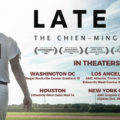Editor’s Note: I’m thrilled to present two perspectives on LATE LIFE: The Chien-Ming Wang Story – both from bay area-raised college students who chose to pursue college in the Midwest. Derek is a student at the University of Michigan, and Vivienne is a student at Washington University in St. Louis.
DEREK SHAO
In baseball, the term “late life” is used to describe sudden and unexpected movement as a pitch crosses home plate. It is a fitting metaphor for pitcher Chien-Ming Wang’s climb back to the Major Leagues, of which Late Life: The Chien-Ming Wang Story captures in spectacular detail.
In 2005, a twenty-five-year-old Wang debuted for the New York Yankees, becoming the organization’s first and only Taiwanese-born player. This was the beginning of perhaps one of the most fascinating four-year stretches in all of sports, as he would go on to establish himself as the Yankees’ ace before suffering a freak baserunning injury in 2008. Unbeknownst to the baseball world at the time, Wang would never return to form again, and would have to watch from the sidelines as the Yankees won the 2009 World Series and eventually cut him from the team.
During his time with the Yankees, Wang’s popularity had skyrocketed in Taiwan, with his face being plastered on billboards and newspapers throughout the country. Despite his reserved demeanor, Wang’s success thrust him into the national spotlight, and he subsequently earned the title of “Taiwan zhiguang,” or the “pride and glory of Taiwan.” This is why after seeing the national icon getting into a rental car in 2013, filmmaker Frank W. Chen decided to document his journey.
As its name suggests, Late Life follows Wang through the latter portion of his career, in which he toils through numerous minor league and independent league teams in an effort to earn a spot on a Major League roster. We get a glimpse into his life as a minor leaguer, and a rather unremarkable one at that. Unlike in the Major Leagues, there are no personal chefs, no team-chartered planes, no flashy hotels for Minor League players. Instead, we see Wang boiling frozen dumplings, driving himself through rural America and doing impromptu exercises in motel rooms. Throughout this journey, we are reminded of Wang’s past dominance with the Yankees, a time when he exceeded expectations and seemed poised to become the next great superstar. It is a harsh reminder of what could have been, and a testament to the fragility and cruelty of a career in professional sports.
Instead, we see Wang boiling frozen dumplings, driving himself through rural America and doing impromptu exercises in motel rooms.
Through interviews with Wang’s family and acquaintances, viewers are given unprecedented insight on his personal motivations and values. More importantly, however, we also get to see the true extent of his influence on Taiwan and the game of baseball, as well as on those who continued to support him throughout his journey. On the surface, Late Life tells the story of a baseball player and a former national icon. Look deeper, however, and you will see that it is also about a father, a son, a friend, and an immigrant.
Look deeper, however, and you will see that it is also about a father, a son, a friend, and an immigrant.
In the documentary’s opening scene, a boy approaches Wang and says, “My mom told me that you’re famous,” to which the pitcher lightheartedly responds, “Before, not now.” To those of us who understand just how big of an impact Wang had on modern Taiwanese culture, this exchange is bound to produce flashbacks of people in the streets of Taiwan wearing jerseys with the number 40 on their backs. Growing up in the States, Wang’s influence transcended beyond that of a national icon, and was to me representative of the American Dream. Despite the brevity of his career, he had risen to the top of a league in which less than 3% of its players were Asian, and in the process demonstrated how someone like me could find success at an elite level.
Just as kids in the 90s wanted to, “Be like Mike,” my Taiwanese American friends and I grew up mimicking Wang’s famously slow windup and sought to replicate his success. For us, Late Life is not just another chapter in the Chien-Ming Wang story, but a heart-warming conclusion that also serves as a reminder of our childhood dreams and aspirations. As we would eventually learn, baseball is a game of failure. It is also a game of inches. For Wang, these lessons will likely remain with him for the rest of his life; lessons that Late Life highlights in its moving depiction of tenacity, grit, and determination.
VIVIENNE CHANG
Chien-Ming Wang (王建民) has Taiwanese blood, a claim that has helped him become “The Pride and Glory of Taiwan.” The unique burden of this honor is what Taiwanese-Canadian director Frank Chen (陳惟揚) hoped to capture: the story of an icon with a story that transcends national and cultural borders.
The film begins with Chien-Ming Wang at one of the lowest points in his career: road-tripping alone, seemingly living out of his car and gas station convenience food. At this point, Wang had just been released from the New York Yankees after suffering a major foot injury in 2008. An elite pitcher with a deadly sinker, he won 19 games in two consecutive seasons for the team between 2005-2008 and was recognized in the 2007 Time 100 for his achievement.
Shortly after he was released, Chien-ming Wang began bouncing around Minor League teams looking for his “after life,” hoping to land a place with the “big boys” in Major League Baseball (MLB) once more. By then, he was 35 years old. But his age did not deter him from trying, giving up his family life to chase after his dream through a network of chiropractors, friends, community members, and coaches.
And he achieved just that. In 2016 he signed with the Kansas City Royals as a relief pitcher. Once again, he brought pride and glory to Taiwan, but ironically, this nationalistic hope was far from being his own dream.
Frank Chen’s vision for the documentary was to bridge the gap between Eastern and Western cultures through a shared appreciation for Chien-Ming Wang. As stated previously, Wang was simultaneously “The Pride and Glory of Taiwan” during the 2000s and a celebrated baseball figure in America. With its release on Netflix and its incorporation of both Mandarin Chinese and English, Chen hoped to touch the hearts of viewers regardless of background, while creating more exposure to Taiwan in the process. However, my deeper analysis suggests that the documentary does not fulfill its intended purpose; in fact, I felt it succeeded more in illuminating distinctions between the cultures.
In the documentary, there are multiple scenes that portray the Taiwanese idolizing Chien-Ming Wang. One of the most glaring is when a huge mob of people immediately crowds around him when Wang and his family step out of the gate in the Taoyuan International Airport. It seems as if the Taiwanese public lacked concern and self-awareness mobbing him almost immediately, in Wang’s most vulnerable state, tired from the airplane ride, American culture does also mirror this behavior – paparazzi and fans crowding around superstars right out of the airport is not an uncommon circumstance. However, from a viewer’s perspective, this behavior comes off as extremely inconsiderate. The fanaticism becomes an unattractive characteristic inextricable from the Taiwanese people in the film.
Chien-Ming Wang also seems to want to separate himself from the weight of cultural identity. In the middle of the documentary, he speaks of having a lot of pressure from carrying Taiwan’s pride. Wang does hope to pave a way for future baseball players from Taiwan to play in the MLB, but he wants them to succeed as individuals not bound to a country’s expectations. In this sense, the documentary showcases that Wang wants to run counter to the director’s mission to bridge the two cultures through an icon. He never asked to be a cultural ambassador; he just wanted to “打好球” (play ball well).
Wang never asked to be a cultural ambassador; he just wanted to “打好球” (play ball well).
It is also important to note the way Chien-Ming Wang’s Taiwanese community describes his personal character and growth compared to his American counterparts. Within the Taiwanese community, persistence comes up often. They seem to link this trait with the fact the he is of Taiwanese heritage, having characteristics that are deeply rooted in his culture. However, in the American community, his coaches and mentors describe him without ties to any cultures or upbringing styles. They attempt to separate themselves from the conversation of race as they champion him to inherently exhibit a hardworking attitude. In fact, many of his mentors describe Chien-Ming Wang as their “son,” dismissing the ironclad grip of the Taiwanese community on someone they saw as one of their own in paramount ways.
No doubt is LATE LIFE: The Chien-Ming Wang Story an amazing story of a hero – one who has conquered, then fallen, and finally risen to his “true form.” It is a story that crosses cultural boundaries as Frank Chen, the director of the documentary has hoped. However, I believe that the narrative arc of this film was less of a bridge and more of a deeper understanding of the space in between. I applaud Chen for directing this documentary so that Taiwanese stories can appear in Western media, but I cannot help but wonder if it served its purpose.
LATE LIFE: The Chien-Ming Wang story is available for streaming on Amazon Prime, Netflix, and more.
You can learn more about the documentary here.
About Derek
Born and raised in the San Francisco Bay Area, Derek Shao is currently a student at the University of Michigan. He enjoys spending his free time watching sports, exercising, and making videos.
About Vivienne
Vivienne Chang is currently a freshman at Washington University in St. Louis, pursuing double majors in Economics & Strategy and Finance. She is an Executive Board member of their Taiwanese Student Organization (TSO) and was previously president of Junior Taiwanese American Student Association at her high school.





Leave a Reply